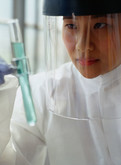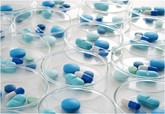Biosimilars/Research
Phase I study comparing SB8 with reference bevacizumab
SB8, developed by Samsung Bioepis, was approved as a biosimilar of the reference product Avastin (bevacizumab) by the European Commission in August 2020 with the brand name of Aybintio [1]. The objective of this phase I study was to compare the pharmacokinetics, safety, tolerability and immunogenicity between SB8 and the European Union (EU) and United States (US) reference products (bevacizumab-EU and bevacizumab-US).
Scientific, legal and regulatory challenges facing biosimilars development
Abbreviated approval pathways for biosimilars – biological products that are highly similar to an originator biological with regard to quality, safety and efficacy [1, 2] – were created to foster competition and lower prices for biological treatments. However, these desired effects have not materialized as quickly as expected in either the US or the European Union.
Safety monitoring for immune-modulating biologicals
A study of adverse events among patients with autoimmune disease identifies numerous cases of serious infection. The study also demonstrates the ability of the Biologics and Biosimilars Collective Intelligence Consortium (BBCIC) to function as a surveillance platform [1].
Real-world data on biosimilars in inflammatory arthritis treatment
The use of biologicals in patients with rheumatic diseases has achieved the therapeutic target, i.e. remission or low disease activity. The share of biologicals has been growing with the approval of biosimilars, which have been recognized for their equivalent efficacy, safety, pharmacokinetics and immunogenicity to the originator, as well as their reduced economic burden.
Study reveals wide variation in US state drug product substitution laws
A new study, published in JAMA Internal Medicine [1], has revealed substantial variation in the drug product substitution rules for pharmacists across states in the US.
Asia Pacific countries: future demand for biosimilars
The prevalence of chronic diseases like diabetes, cancer and rheumatoid arthritis have been increasing globally, resulting in an ever-growing need for biologicals that are affordable and accessible in the Asia Pacific countries (APAC). Biosimilars are ‘similar’ versions of approved and authorized biological medicines that are already on the market. They typically sell at discounts ranging from 20% to 35% when compared to the reference product [1]. It is expected that introduction of biosimilars into the global markets will erode the total sales of biologicals by as much as 54% through 2022 [2]. Various regulatory bodies such as the European Medicines Agency (EMA), the US Food and Drug Administration (FDA) and the World Health Organization (WHO) actively regulate development and commercialization of biosimilars.
Biopharmaceuticals and biosimilars: regulatory challenges for global harmonization of GMP standards
A recent GaBI Journal [1] article by Sia et al. has explored biopharmaceutical good manufacturing practice (GMP) standards around the globe. The authors uncovered the challenges faced in attempting to achieve global harmonization of biopharmaceutical GMP standards.
Discontinuation following biosimilar switching in IBD patients
Medical management of inflammatory bowel diseases (IBD) has significantly improved since the introduction of biological therapies over the past 20 years. The adoption of biologicals in IBD care has led to an exponential increase in treatment-related costs, resulting in a huge economic impact. As the patents of older biologicals expire, the interest in marketing comparable versions of the reference products increases, enabling opportunities for the development of similar biological products. Biosimilars have the potential to expand access to biological therapies due to price competition and cost savings [1].
Global harmonization of GMP standards for biologicals
Biopharmaceuticals are complex as their active pharmaceutical ingredient (API) is manufactured using living systems. In turn, this leads to complex manufacturing processes. A recent GaBI Journal [1] article by Sia et al. has investigated the good manufacturing practice (GMP) standards of various global regulatory authorities (RAs) and international organisations (IOs). It has revealed that we are well on the way to global harmonization of GMP standards that will help bring these products to more people across the globe.
A blueprint for biosimilar assessment without efficacy trials
Comparative efficacy trials have played an important role in biosimilarity assessments. However, with recent technological advances, their role is now being questioned. Research published in Drug Discovery Today [1] outlines the reasons why biosimilar assessments can now be carried out without these trials [2, 3]. It also lays out the requirements for prospective applications without efficacy trials.












